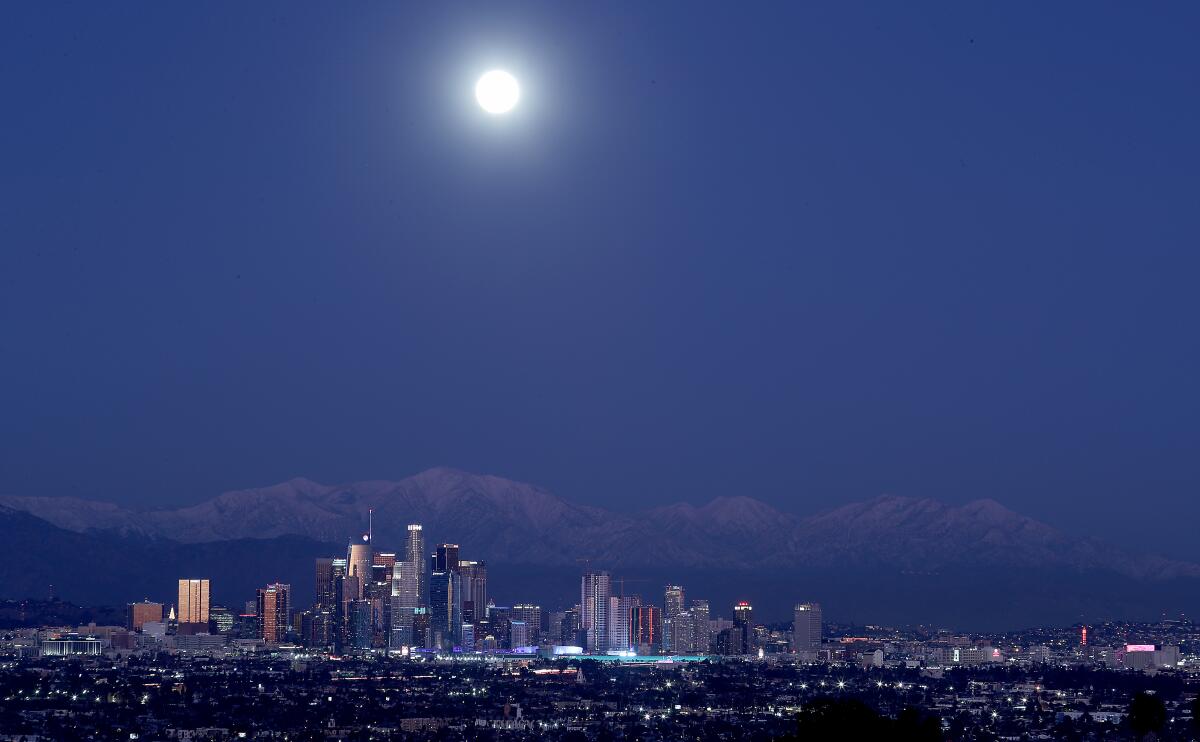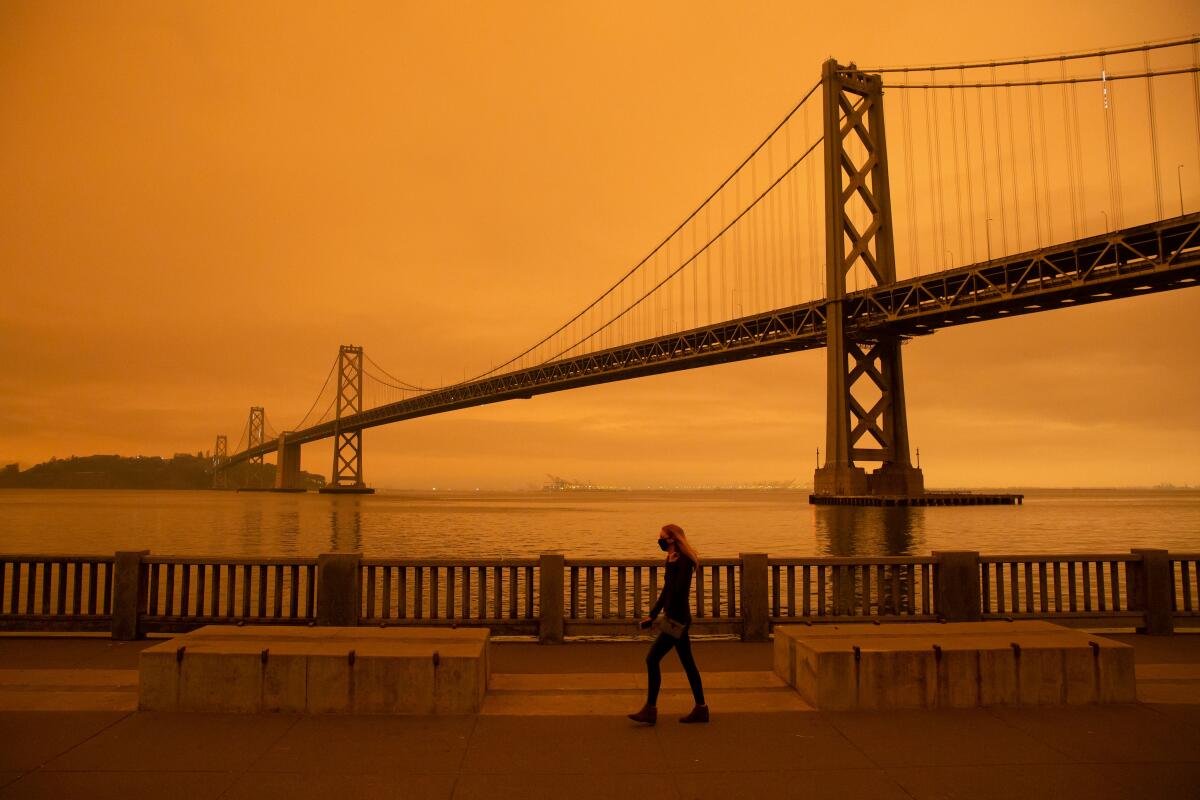‘Today is the day that life has changed’: An oral history of L.A., COVID-19 and 2020

- Share via
Even the most world-altering of years will get winnowed down in time, eventually condensed to a string of bullet points in a skimmed-over textbook.
But if you survived 2020, certain fragments will surely live on in your head, permanently etched into place.
I asked readers to share their most indelible memories of the year. Taken together, the responses formed a kind of kaleidoscopic year in review. All of the era-defining moments were there, but refracted through individual lives.
In the first month of the year, a young mother in Los Angeles made dinner in her apartment kitchen. NPR played as she cooked, just background noise, really. Until it cut through.
The story was about a city whose name few of us had known a few weeks prior, under siege from a novel virus. The woman distinctly remembers feeling — right then, in the moment — like it was foreshadowing. Like this was the scene that would play just before the movie got scary.
In the beginning of the year, history blared toward us in push alerts and the text scrolling across the bottom of our TV screens. But it was far away. It couldn’t touch us. Our lives were still so full, and there were plenty of other things to cheer and grieve.
Sign up for Essential California
The most important California stories and recommendations in your inbox every morning.
You may occasionally receive promotional content from the Los Angeles Times.
Still January: Norma Montenegro was on her way to the gym when a friend called to ask if she’d heard the rumor. Montenegro, an HR professional in Los Angeles, pulled her car over right there on Brand Boulevard. When she opened her phone and saw the TMZ tweet — “BREAKING: Kobe Bryant Has Died In A Helicopter Crash” — she let out the loudest scream of her life. She sobbed in her parked car for an hour before she could drive home.
We continued with our business in February, as the headlines worsened in other places. There was more of that foreshadowing, more terrible scenes from afar.
In the third month of the year, it all came home to roost.
Somewhere in Sacramento in the second week of March, Juan Altamirano was watching a dumb, mindless movie on TV. And then he looked at his phone and saw that Tom Hanks had tested positive for the coronavirus.
Today is the day, the environmental lobbyist immediately thought to himself. Today is the day that life has changed.
The memories from that strange sliver of time all sounded like variations on Altamirano’s — personal turning points, where the crisis at hand suddenly became real to them.
Retired journalist Becci Rogers was sitting in Sacramento’s Golden 1 Arena, waiting for tipoff at a Kings game. Then the announcement came over the loudspeaker. The game had been postponed and the thousands of fans were being asked to leave. The NBA wouldn’t play again for months.
Like a half-dozen other respondents, Yifang Nie’s moment of indelibility came in a barren grocery store midway through the month of March.
R.E.M’s “It’s the End of the World as We Know It (and I Feel Fine)” blared over the speakers in a San Francisco Trader Joe’s, as she searched the vacant shelves. There was nothing left to buy.
Mayors and governors entered our living rooms in daily briefings. We came to know our local public health officials by name.
World events unraveled our daily lives and rearranged them in new and cloistered shapes.
I cried my way through Zoom weddings and bar mitzvahs and brises, remaining on the same couch in the same city while small clusters of people I loved assembled themselves into the frame in various parts of the country.
A mother in Santa Clarita described viewing her daughter’s graduation ceremony on YouTube. After, the family drove to a local park. Sitting in their gray minivan, they watched as their oldest daughter walked across a stage to collect her high school diploma.
Even a once-in-a-century pandemic couldn’t stop the milestones of life. Nor could it prevent the ordinary tragedies.
More than a few people described their indelible memory as a last moment with a loved one, before a death that had nothing to do with COVID-19. They were, in a strange way, among the lucky ones — at least they could be there in person.
A lawyer in Los Angeles described not being able to say goodbye to a friend dying of cancer. COVID-19 visiting restrictions at the hospital prohibited it.
She watched the funeral on Facebook Live with a few of her closest friends, spaced six feet apart in front of a big-screen TV.
It was all so surreal. They made a point of going into another room to blow their noses when their weeping required it, because doing so would mean lowering their masks.
Everything happened on screens.
In the last days of May, a video documenting George Floyd’s death under the knee of a Minneapolis cop ricocheted around the globe.
For some of the country, the video was gutting but unsurprising, reflecting a reality they were already all too familiar with. But it woke many others out of a kind of stupor, forcing them to grapple with how racism shapes nearly every facet of American life. Millions took to the streets.
A summer of fear and fires followed. Filmmaker Sarah Gertrude Shapiro remembers a particularly apocalyptic moment when a record-setting heat wave broiled Los Angeles, as blazes burned in all directions. Ash rained down from the sky as she frantically hosed down her pandemic-acquired pet chickens, trying to keep them alive in the 119-degree heat.

Several Bay Area readers described the morning they awoke to orange, Martian skies.
In the Sierra Nevada mountains, Fresno Bee reporter Carmen George remembers watching an 85-year-old woman walk through the ruins of her former life for the first time after the Creek fire.
Amid the ashes was a ceramic jar that the woman’s son had given her as a gift before he died, unscathed by the fire. George asked the woman if it was special, seeing that this meaningful object had somehow survived.
No, the woman told her. “Nothing is special anymore.”
It was a year that often felt merciless.
Camilo Loza, a line cook in Los Angeles, was serving food on skid row this fall when a man quietly asked if he could have a little extra. The man said he hadn’t eaten in five days.
The moment seared itself into Loza’s brain because there were so many things they wanted to do and say. But the line behind the man was too long to do anything more than wish him well, heap a little extra onto his plate, and turn to the next person waiting to be served.
Mahasin Ahmad, a certified nurse assistant and single mother in San Bernardino, described the feeling of constantly being at a breaking point. Juggling two jobs to make ends meet, there was never enough time to give her little ones the help they needed with school. And the bills just continued to pile up.
But there were also flashes of radiance.
Sue Kamm, a retired librarian in Silver Lake, recalled ringing a large school bell after finishing her last chemotherapy treatment for ovarian cancer. She has remained cancer-free through two follow-up CT scans.
Several people described their jubilation at the results of the presidential election, and the subsequent dancing in the streets. The Dodgers and the Lakers both won championships.
Pam Haas’ moment of indelibility came in a San Pedro church, looking into the brown-green eyes of the man she loves. She and Ken Haas had first met and briefly dated in the 1960s, before life tugged them in different directions. He found her again more than five decades later on LinkedIn, and flew across the country to visit her a few weeks later.
On Valentine’s Day of this year, they exchanged wedding vows. The first-time bride said her brothers were happy she finally decided to settle down at 76.
Up in Sonoma County, Penny Paden’s telephone rang as she was emptying the dishwasher one day this fall.
In March, the Padens’ beloved cat Roxanne had disappeared. They had papered the neighborhood with flyers, searching and searching. Then COVID-19 came, and the sorrows of the world drowned out whatever faith was left in finding Roxanne.
But a year and a half later, there was a veterinarian on the phone, saying someone had dropped off a scraggly, stray cat with a microchip identifying her as theirs.
Some losses are permanent. And sometimes joy resurfaces long after we’ve given up hope.
More to Read
Sign up for Essential California
The most important California stories and recommendations in your inbox every morning.
You may occasionally receive promotional content from the Los Angeles Times.














